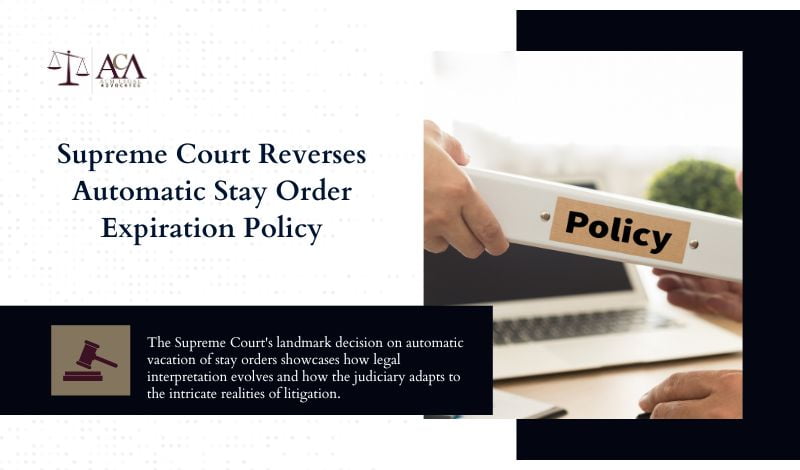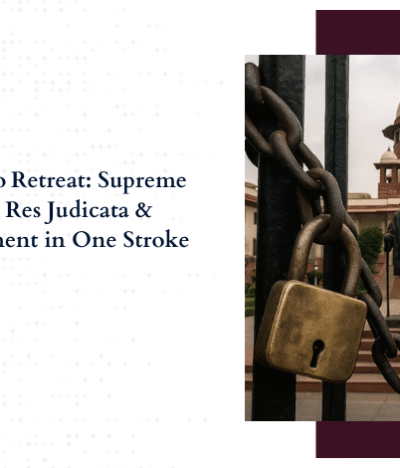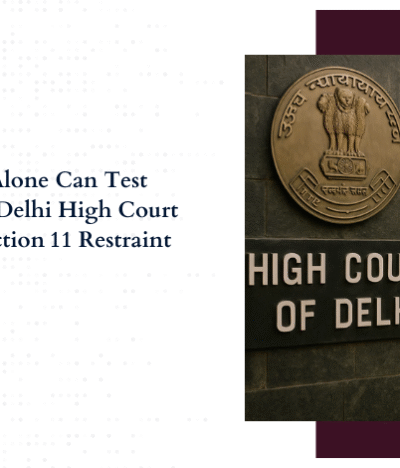In a landmark decision passed on Thursday, February 29, 2024, the Supreme Court of India has reversed its prior 2018 judgement, known as the ‘Asian Resurfacing ruling’, which previously established that interim orders issued by High Courts to pause proceedings in civil and criminal cases would lapse automatically after six months unless specifically extended by giving reasons. This pivotal new ruling was delivered by a Constitution Bench of Five Judges, including Chief Justice of India DY Chandrachud and Justices Abhay S. Oka, J.B. Pardiwala, Pankaj Mithal and Manoj Misra.
Details of the Supreme Court’s Decision
The Constitution Bench of the Supreme Court was called upon to decide the following questions:
- Whether this Court, in the exercise of its jurisdiction under Article 142 of the Constitution of India, can order automatic vacation of all interim orders of the High Courts of staying proceedings of Civil and Criminal cases on the expiry of a certain period?
- Whether this Court, in the exercise of its jurisdiction under Article 142 of the Constitution of India, can direct the High Courts to decide pending cases in which interim orders of stay of proceedings has been granted on a day-to-day basis and within a fixed period?
In the majority opinion authored by Justice Oka, it was emphasized that a blanket directive requiring the expiration of all interim orders after a fixed period is not viable under the powers given under Article 142 of the Constitution. The Bench collectively asserted that Constitutional Courts should avoid mandating fixed timelines for the resolution of pending cases, as the dynamics of case backlog vary significantly across different Courts. They recommended that the decision to fast-track certain cases should remain at the discretion of individual judges, who are more familiar with the specific conditions and challenges of their respective Courts.
Justice Pankaj Mithal, in a separate concurring opinion, held that reasoned stay orders granted in civil and criminal proceedings shall remain in operation, provided they are not time bound, till the main matter is decided or till an application for vacation is moved and a speaking order is passed adhering to the principles of natural justice thereby either extending, modifying, varying or vacating the same.
The Constitution Bench was hearing a reference by a Bench of Three Judges vide Order dated 01.12.2023 against the March 2018 judgement in Asian Resurfacing of Road Agency v. Central Bureau of Investigation last year, before reserving its verdict on December 13, 2023. This stemmed from an appeal against an Allahabad High Court decision which doubted the ‘automatic stay vacation rule’ and framed ten questions of law for the Apex Court to consider.
Observations
Legal and Judicial Concerns Raised
The Supreme Court’s decision to overturn the automatic vacation of stay orders has elicited significant legal debate and consideration. The main arguments and observations presented during the hearing can be broken down as follows:
Impact on Litigants
The judgement authored by Justice Oka highlighted the potential adverse effects of automatic vacation of stay orders on the parties involved in the litigation. The primary concern was that such a mechanistic approach would unfairly prejudice litigants who would be adversely affected by circumstances beyond their control, leading to miscarriage of justice. It was observed that if an interim order is automatically vacated without any fault on the part of the litigant only because the High Court cannot hear the main case, the maxim “actus curiae neminem gravabit” will apply which means that no litigant should be allowed to suffer due to the fault of the Court as if that happens then it is the bounden duty of the Court to rectify its mistake.
Judicial Discretion
A critical aspect of the discussions revolved around the importance of maintaining judicial discipline by exercising judicial discretion fairly. The Apex Court observed that the decision to vacate a stay order should not be automatic but should instead be a considered judicial act involving application of mind by taking into account the specific circumstances of each case. This approach emphasizes the need for a thoughtful application of judicial discretion rather than a one-size-fits-all rule.
Power of Supreme Court under Article 142 of the Constitution
The directions in Asian Resurfacing judgement were passed in the exercise of the powers given under Article 142 of the Constitution. The Supreme Court, therefore, dealt with this aspect and observed that the powers given under Article 142 of the Constitution of India are meant to further the cause of justice and to secure complete justice and that the directions in the exercise of power under Article 142 cannot be issued to defeat justice. It was held that the jurisdiction under Article 142 cannot be invoked to pass blanket orders setting at naught a very large number of interim orders lawfully passed by all the High Courts, and that too, without hearing the contesting parties. Thus, it was concluded that the jurisdiction under Article 142 can be invoked only to deal with extraordinary situations for doing complete justice between the parties before the Court.
Preservation of Constitutional Powers
The argument also extended to the preservation of the constitutional structure, particularly the powers under Article 226 that empower High Courts to issue writs. Concerns were raised about how automatic vacation of stay orders could interfere with these constitutional powers and disrupt the balance of judicial discretion.
Need for Nuanced Legal Framework
It was stressed, inter alia, that it is important for allowing the Courts to maintain their discretion, especially in deciding the duration and conditions of stay orders. That a blanket directive for automatic vacation of stay orders could lead to unintended and unfavourable consequences, including contempt cases against judges who do not resume trials within six months.
Balancing Speedy Trials with Procedural Fairness
The discussions underscored the need to balance the imperative of speedy trials with the principles of justice and fair adjudication. While the expeditious resolution of cases is a critical goal, it should not compromise the fairness and thoroughness of judicial processes. This balance is essential for ensuring that justice is both served and seen to be served.
Observations and Legal Philosophy
The Supreme Court’s deliberations reflect a broader legal philosophy that values judicial discretion and the nuanced consideration of individual cases over rigid procedural rules. By reversing the law laid down in Asian Resurfacing with respect to automatic vacation of stay orders, the Supreme Court is advocating for a more flexible, equitable and case-sensitive judicial process.
This adjudication also signifies a shift towards a more individualized approach to justice, where the facts and circumstances of each case shall be accorded due consideration. This approach is in line with the broader principles of natural justice and the rule of law, emphasizing that legal proceedings be fair, transparent and tailored to the specific needs and challenges of each case.
Background and Implications
The backdrop of the Supreme Court’s recent decision begins with its 2018 ruling in the case of “Asian Resurfacing of Road Agency Pvt. Ltd. v. Central Bureau of Investigation”. This judgement, delivered by a Bench of Three Judges comprising Justices A.K. Goel, Navin Sinha and Rohinton Fali Nariman, introduced a significant procedural change i.e. it mandated that interim stay orders granted by High Courts in all civil and criminal proceedings would automatically expire after six months, unless specifically extended by the issuing Court. This ruling aimed to address and mitigate the protracted delays often encountered in the judicial process.
Following the implementation of the Asian Resurfacing judgement, the legal fraternity voiced concerns regarding its practical implications. The judgement on automatic vacation of stay orders was criticized for potentially undermining the High Courts’ and Trial Courts’ authority and ability to address the specific nuances and complexities inherent in diverse legal disputes. There was a growing consensus that such a mechanistic approach might not adequately serve the interests of justice, leading to arbitrary outcomes and possible miscarriage of justice.
Allahabad High Court’s Response
The Allahabad High Court, in response to the implications stemming from the Asian Resurfacing judgement, expressed reservations about the automatic stay vacation rule. In a subsequent legal discourse, the High Court raised questions regarding the practicality and fairness of the automatic stay vacation rule, especially in light of the diverse and often complicated nature of cases. This led to an appeal to the Supreme Court, urging a reconsideration and re-evaluation of the 2018 ruling, on the basis of the ten legal questions framed that called into question the automatic stay vacation rule and its implications.
Supreme Court’s Reconsideration
Prompted by the legal challenges and the critique from the Allahabad High Court, the Supreme Court revisited the 2018 judgement.
The reconsideration of the judgement by the Supreme Court underscores the judiciary’s commitment to refining legal procedures to better serve the principles of fairness, individual rights and ensure effective administration of justice.
Conclusion
In summary, the evolution of the Supreme Court’s stance on automatic vacation of stay orders is a testament to the dynamic nature of legal interpretation and the judiciary’s responsiveness to the complexities of real-world litigation. The Court’s decision underscores a recommitment to ensuring that legal procedures accommodate the diverse and complex realities of litigation, thereby upholding the principles of justice, fairness, and equity inherent in the rule of law.






